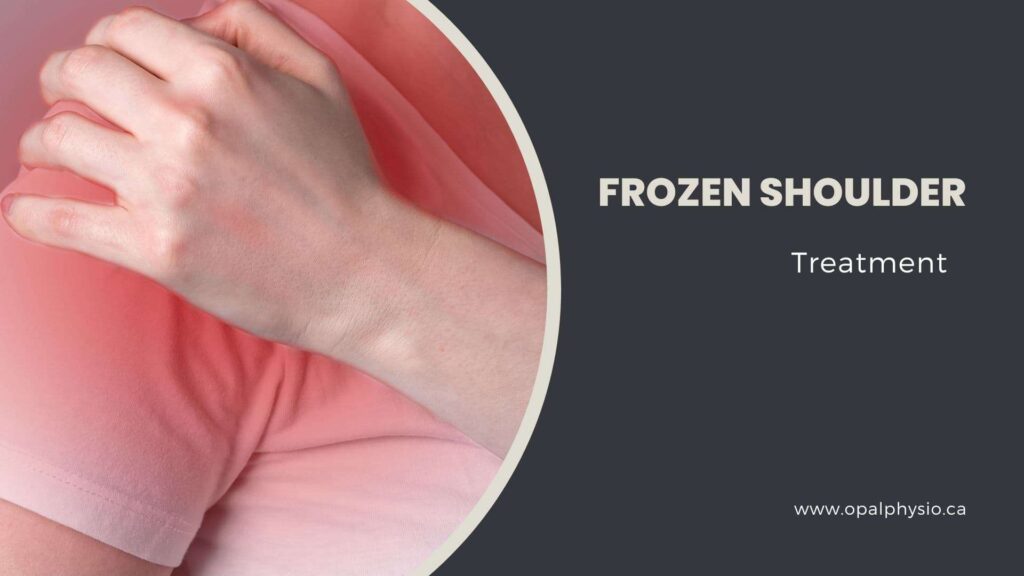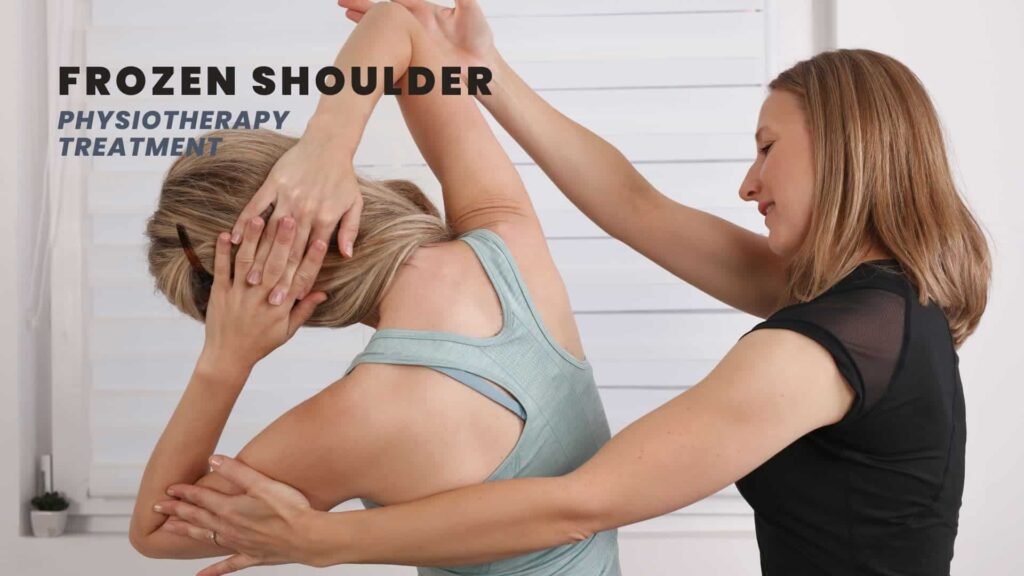Frozen Shoulder Treatment in Langley
Frozen Shoulder / Adhesive Capsulitis
A frozen shoulder is characterized by pain, stiffness, and limited range of motion in the shoulder joint. It typically affects people between the ages of 40 and 60, with women being more susceptible than men.
The condition usually progresses through three stages: freezing (painful), frozen (stiff), and thawing (recovery) stage.
Frozen shoulder treatment and physiotherapy
Physiotherapy is crucial in managing and treating frozen shoulders, focusing on pain relief, restoring mobility, and improving function.
Our team of experienced physiotherapists can help alleviate your stiffness and pain and improve the range of motion in your shoulder joint.

What Is frozen shoulder?
Frozen shoulder (FS), also called “Adhesive capsulitis,” is when the shoulder becomes immobile, typically from inflammation.
A shoulder capsule is a group of connective tissues that attach the arm bone (humerus) to the shoulder blade (scapula). In adhesive capsulitis, the shoulder capsule becomes inflamed and tight, causing pain in the shoulder. The condition can develop at any age but often is seen in adults.
It is a painful and debilitating condition, which can cause problems with daily activities like dressing or reaching for something on a high shelf or behind the back. It is a common musculoskeletal disorder affecting the shoulder joint. The pain lasts for weeks or months, making it challenging to move the arm.
Learn more about frozen Shoulder.
Causes of frozen shoulder
The causes of frozen shoulder include:
- Lack of shoulder movement during recovery from a shoulder injury, broken arm, or stroke.
- Inflammation of muscles and tendons, such as rotator cuff tendinitis or bursitis, can cause inflammation of the muscles and tendons around the shoulder joint, leading to a frozen shoulder.
- The capsule surrounding the shoulder joint becomes inflamed and thickened, restricting movement; however, the exact reason for this inflammation is not fully understood.
Risk factors for frozen shoulder
The risk factors that can increase the chances of developing adhesive capsulitis may include:
Symptoms of frozen shoulder
Some of the symptoms of a frozen shoulder are:
What is the difference between a stiff shoulder and a frozen shoulder?
The term “stiff shoulder” and “frozen shoulder” are often used interchangeably to describe a painful, stiff shoulder condition. However, there are some differences between the two.
Various conditions, such as rotator cuff tendinitis, bursitis, or arthritis in the shoulder joint, can cause a stiff shoulder. On the other hand, a frozen shoulder is characterized by pain, stiffness, and significant loss of passive range of motion in the shoulder joint due to inflammation and thickening of the joint capsule.
Phases of frozen shoulder
The stages of a frozen shoulder can typically last for several months.
- Inflammatory phase with constant, diffuse and significant pain. The inflammatory phase is usually triggered when the body is injured or exposed to an irritant.
- Frozen phase with a restricted range of movement in the shoulder and pain during movements which may gradually progress to a partial loss of function.
- The thawing phase in the frozen shoulder is where the pain is intermittent during movement, and the patient begins to regain mobility in the shoulder.
General treatment and management of frozen shoulder

Physiotherapy rehabilitation for a frozen shoulder In Langley
The primary goal of physiotherapy for a frozen shoulder treatment is to control pain and restore motion and strength through a combination of the following interventions:
Patient education: Informing patients about the condition, its stages, and the importance of adhering to the prescribed treatment plan.
Pain management: Heat or cold application, Laser therapy, and ultrasound therapy can be used as pain management in physiotherapy for frozen shoulders. However, the effectiveness of these interventions may vary depending on the individual and the specific treatment plan.
Stretching exercises: Gentle stretching exercises within the patient’s pain-free range of motion are provided to help maintain and improve shoulder mobility.
Manual therapy: Physiotherapists may use hands-on techniques, such as joint mobilizations, to help improve shoulder movement.
Strength exercises: As the patient’s range of motion improves, our physiotherapist may introduce strength exercises targeting the rotator cuff and other shoulder muscles around the joint.
Home exercises: Physiotherapists will prescribe home exercises to complement in-clinic treatment. These exercises are tailored to the patient’s symptoms and condition stage. Patients are encouraged to perform these exercises regularly and consistently to achieve the best results.
Prevention and maintenance: To prevent the recurrence or worsening of a frozen shoulder, patients are educated on the importance of performing prescribed exercises and maintaining an active lifestyle. Regular follow-ups with the physiotherapist can help monitor progress and make necessary adjustments to the treatment plan.
Learn more about Frozen Shoulder Exercises.
Physiotherapy plays a vital role in the treatment and management of frozen shoulder. Our physiotherapists can help patients regain mobility, reduce pain, and improve overall function by combining pain management, stretching exercises, manual therapy, strength exercises and home management to support recovery and prevent recurrence.
Contact us today to schedule a consultation with one of our physiotherapists to help with your recovery after a frozen shoulder.
